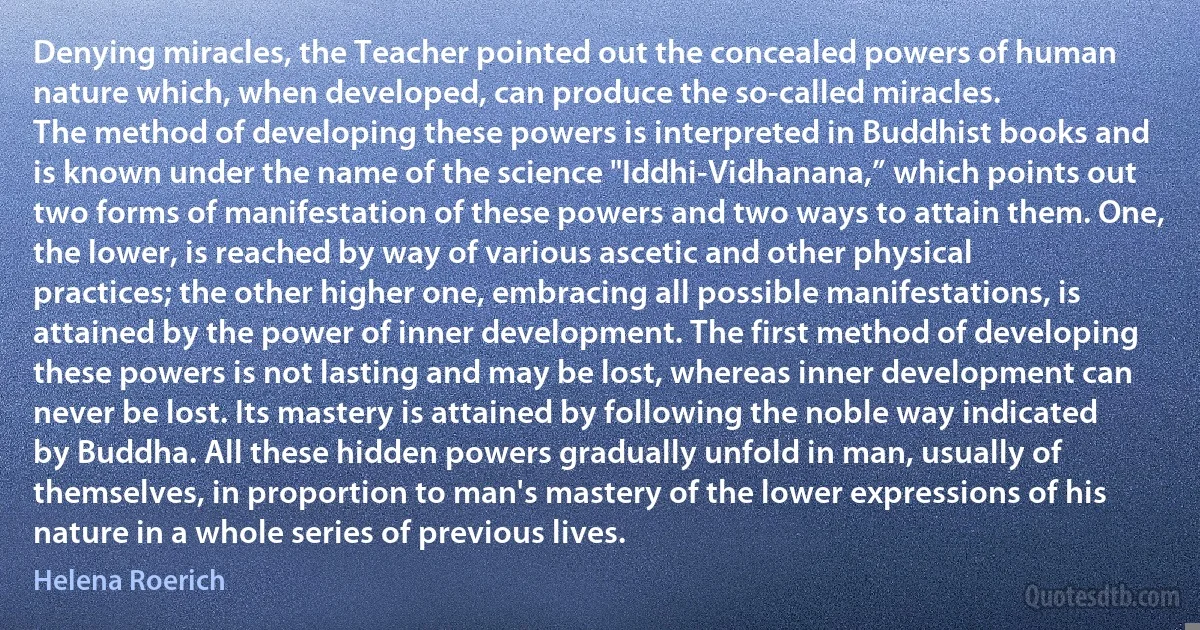
Denying miracles, the Teacher pointed out the concealed powers of human nature which, when developed, can produce the so-called miracles. The method of developing these powers is interpreted in Buddhist books and is known under the name of the science "Iddhi-Vidhanana,” which points out two forms of manifestation of these powers and two ways to attain them. One, the lower, is reached by way of various ascetic and other physical practices; the other higher one, embracing all possible manifestations, is attained by the power of inner development. The first method of developing these powers is not lasting and may be lost, whereas inner development can never be lost. Its mastery is attained by following the noble way indicated by Buddha. All these hidden powers gradually unfold in man, usually of themselves, in proportion to man's mastery of the lower expressions of his nature in a whole series of previous lives.
Helena RoerichRelated topics
ascetic denying developing development following hide human known lasting lives lost lower man manifestation name nature noble possible power produce science series teacher under unfold way higher points waysRelated quotes
A number of proposals have been advanced in recent years for the development of ‘general systems theory' which, abstracting from properties peculiar to physical, biological, or social systems, would be applicable to all of them. We might well feel that, while the goal is laudable, systems of such diverse kinds could hardly be expected to have any nontrivial properties in common. Metaphor and analogy can be helpful, or they can be misleading. All depends on whether the similarities the metaphor captures are significant or superficial.
It may not be entirely vain, however, to search for common properties among diverse kinds of complex systems... The ideas of feedback and information provide a frame of reference for viewing a wide range of situations, just as do the ideas of evolution, of relativism, of axiomatic method, and of operationalism... hierarchic systems have some common properties that are independent of their specific content...

Herbert Simon
Man may be excused for feeling some pride at having risen, though not through his own exertions, to the very summit of the organic scale; and the fact of his having thus risen, instead of having been aboriginally placed there, may give him hopes for a still higher destiny in the distant future. But we are not here concerned with hopes or fears, only with the truth as far as our reason allows us to discover it. I have given the evidence to the best of my ability; and we must acknowledge, as it seems to me, that man with all his noble qualities, with sympathy which feels for the most debased, with benevolence which extends not only to other men but to the humblest living creature, with his god-like intellect which has penetrated into the movements and constitution of the solar system - with all these exalted powers - Man still bears in his bodily frame the indelible stamp of his lowly origin.

Charles Darwin
Just as the human population was starting its unprecedented growth spurt in the late eighteenth century, this was published. It's a first edition of an essay on population by the English clergyman Thomas Malthus. Malthus made a very simple observation about the relationship between humans and resources and used it to look into the future. He pointed out that "the power of population is indefinitely greater than the power of the earth to produce subsistence for man." Food production can't increase as rapidly as human reproduction. Demand will eventually outstrip supply. Malthus goes on to say, if we don't control human reproduction voluntarily, life could end in misery, which earned him a reputation as a bit of a pessimist. But Malthus' principle remains true. The productive capacity or the Earth has physical limits and those limits will ultimately determine how many human beings it can support. m10s58-m12s18.

David Attenborough
We are told that Shakespeare's plays were generally performed in barns and that no great trouble was taken over the production. The constant changes of scene which, incidentally, seem the sign of a decadent art rather than one which is progressing, were shown by placards with the inscription: "A Forest," "A Prison," and so on. Within this conventional setting the onlooker's imagination was free to follow the actions of the various characters who were animated by passions drawn from nature, and that was enough for him. So-called innovations are gratefully seized on as an excuse for poverty of invention and in the same way, the long descriptive passages that so overburden modern novels are a sign of sterility, for it is obviously easier to describe a dress or the outward appearance of an object than to trace the subtle development of a character or portray the emotions of the heart.

Eugène Delacroix
Of all forms of symbolism, language is the most highly developed, most subtle, and most complicated. It has been pointed out that human beings, by agreement, can make anything stand for anything. Now, human beings have agreed, in the course of centuries of mutual dependency, to let the various noises that they can produce [...] stand for specified happenings in their nervous systems. We call that system of agreements language. For example, we who speak English have been so trained that, when our nervous systems register the presence of a certain kind of animal, we may make the following noise: "That's a cat." Anyone hearing us expects to find that, by looking in the same direction, he will experience a similar event in his nervous system -- one that will lead him to make an almost identical noise. Again, we have been so trained that when we are conscious of wanting food, we make the noise "I'm hungry."

S. I. Hayakawa
